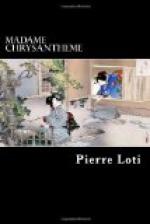I listen, lying there with eyes half shut, looking out between my drooping eyelids which are gradually lowering, in involuntary heaviness, upon the enormous red sun dying away over Nagasaki. I have a somewhat melancholy feeling that my past life and all other places in the world are receding from my view and fading away. At this moment of nightfall I feel almost at home in this corner of Japan, amidst the gardens of this suburb; I have never had such an impression before.
L.
September 16th.
Seven o’clock in the evening. We shall not go down into the town to-day; but, like good Japanese citizens, remain in our loftly suburb.
In undress uniform we shall go, Yves and I, in a neighborly way, as far as the fencing gallery, which is only two steps off, just above our villa, and almost abutting on our fresh and scented garden.
The gallery is closed already and a little mousko seated at the door, explains with many low bows that we come too late, all the amateurs are gone; we must come again to-morrow.
The evening is so mild and so fine, that we remain out of doors, following without any definite purpose the pathway which rises ever higher and higher, and loses itself at length in the solitary regions of the mountain among the upper peaks.
For an hour at least we wander on,—an unintended walk,—and finally find ourselves at a great height commanding an endless perspective lighted by the last gleams of daylight; we are in a desolate and mournful spot, in the midst of the little Buddhist cemeteries, which are scattered over the country in every direction.
We meet a few belated laborers, who are returning from the fields with bundles of tea upon their shoulders. These peasants have a half savage air, half naked too, or clothed only in long robes of blue cotton; as they pass, they salute us with humble bows.
No trees in this elevated region. Fields of tea alternate with tombs: old granite statues which represent Buddha in his lotus, or else old monumental stones on which gleam remains of inscriptions in golden letters. Rocks, brushwood, uncultivated spaces, surround us on all sides.
There are no more passers-by, and the light is failing. We will halt for a moment, and then it will be time to turn our steps downwards.
But, close to the spot where we stand, a box in white wood provided with handles, a sort of sedan-chair, rests on the freshly disturbed earth, with its lotus of silvered paper, and the little incense-sticks burning yet, by its side; clearly someone has been buried here this very evening.
I cannot picture this personage to myself; the Japanese are so grotesque in life, that it is almost impossible to imagine them in the calm majesty of death. Nevertheless, let us move further on, we might disturb him; he is too recently dead, his presence unnerves us. We will go and seat ourselves on one of these other tombs, so unutterably ancient that there can no longer be anything within it but dust. And there, seated yet in the dying sunlight, while the valleys and plains of the earth below are already lost in shadow, we will talk together.




